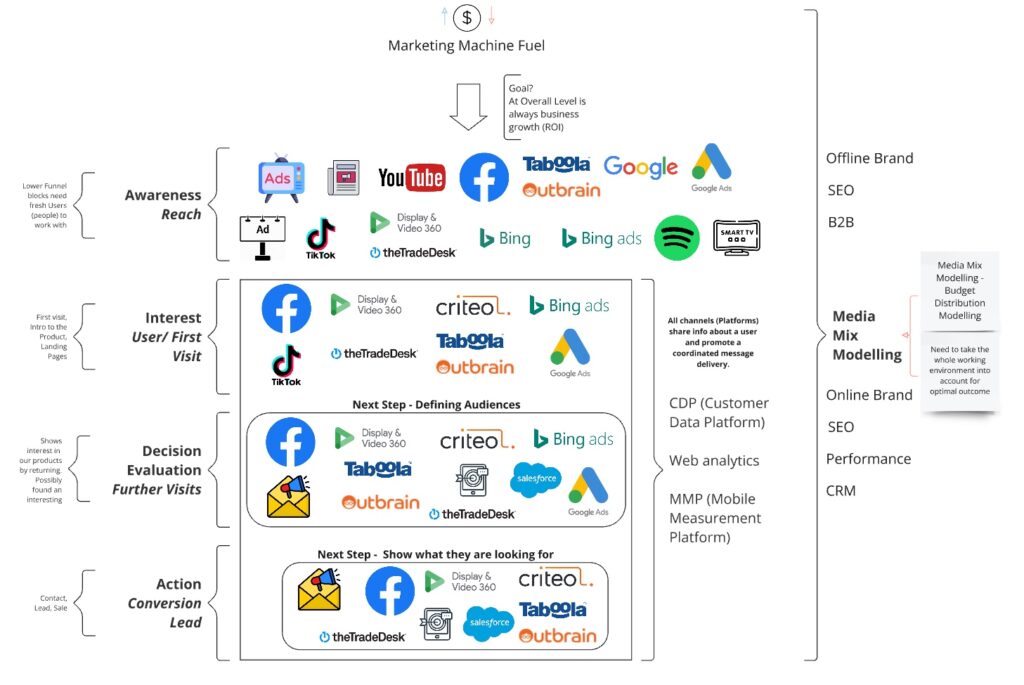Case Studies
03
Portfolio
Building a Marketing Machine: Understanding the Funnel
Project goal: Understand what is the key factors that make the business KPIs move, enabling informed investments decisions and pulling the right strings in product and marketing, allowing for magnified impact of company wide operations.
Solution: Deep dive on product offerings, product quality, marketing campaigns setup and cross team ways of working.
Impact: Improved understanding of product and a better organisational structure, where teams are aware of each other, enabled wiser marketing investments.

What is a Marketing Funnel?
A marketing funnel represents the customer journey from awareness to conversion. It visualizes the process of attracting potential customers, nurturing their interest, and ultimately guiding them toward taking action. Understanding the funnel helps businesses optimize marketing efforts and maximize return on investment (ROI).
Breaking Down the Funnel Stages
1. Awareness
At this stage, potential customers first discover your brand. They might come across your content through social media, search engines, ads, or word-of-mouth referrals. The goal here is to create strong brand visibility and leave a lasting impression.
2. Interest
Once aware of your brand, prospects begin engaging with your content, products, or services. They may explore your website, follow you on social media, or sign up for newsletters. Effective content marketing, email nurturing, and retargeting strategies play a vital role at this stage.
3. Decision
Customers are now evaluating whether your product or service is the right fit for them. They might compare pricing, read reviews, or engage with your sales team. This is where trust-building tactics like testimonials, case studies, and personalized offers help push them toward making a decision.
4. Action
The final stage is where the customer makes a purchase or takes the desired action (sign-up, booking, subscription, etc.). A smooth checkout experience, strong customer support, and follow-up communication are crucial to ensuring conversion and fostering long-term loyalty.
Why Is Understanding the Funnel Crucial for Your Business?
1. Informs Marketing Investments
Your marketing spend should align with your business goals, product availability, and macroeconomic conditions. Are you entering a competitive market? Do you need to expand brand awareness or focus on retention? Understanding the funnel guides your investment strategy.
2. Ensures Sustainable Growth
Each funnel stage requires different marketing strategies and budget allocations. Investing heavily in awareness without optimizing the decision and action stages leads to wasted resources. A balanced approach ensures efficient lead nurturing and high conversion rates.
3. Lower Funnel Success Relies on Product & Data Quality
At the bottom of the funnel, marketing effectiveness depends on user perceived product quality and data quality. Poor tracking data leads to wasted ad spend and missed opportunities. Implementing robust analytics and attribution models is key to improving ROI.
Further Considerations for Optimizing Your Marketing Machine
1. Marketing is the Entrance to Your Product
Great marketing can bring users to your product, but if the product experience is poor, retention and conversions will suffer. A seamless user experience is crucial for maximizing marketing impact.
2. Customer Journeys Are Not Linear
Not all users follow a straight path through the funnel. They may enter, leave, and re-enter at different points. Some may convert quickly, while others take months. Understanding these variations helps tailor your strategies accordingly.
3. Data Drives Performance
Marketing platforms rely on data feedback to optimize campaigns. The more accurate and structured your tracking, the better your campaigns will perform. Invest in first-party data collection and analytics tools to enhance targeting and measurement.
4. Avoid Campaign Cannibalization
Different campaigns often target the same audience segments, leading to self-competition and inefficiencies. Implement audience segmentation and campaign mix strategies to prevent overlap and maximize impact.
Final Thoughts
A well-structured marketing funnel helps businesses allocate resources effectively, refine their strategies, and drive sustainable growth. If you’re looking to evaluate and optimize your marketing efforts, reach out for a consultation—we’ll help you build a high-performing marketing machine!
